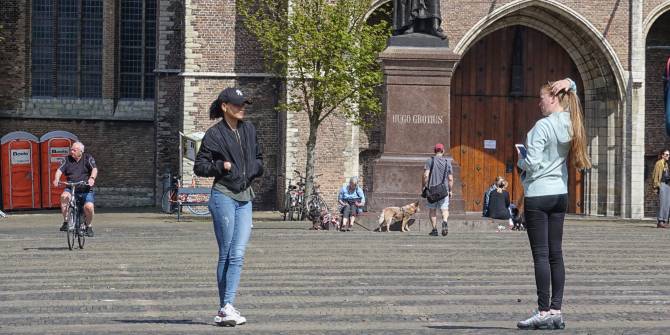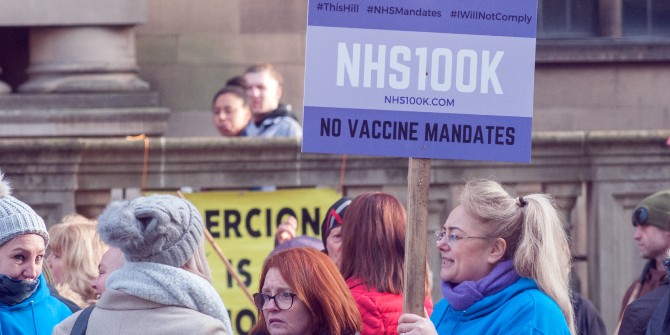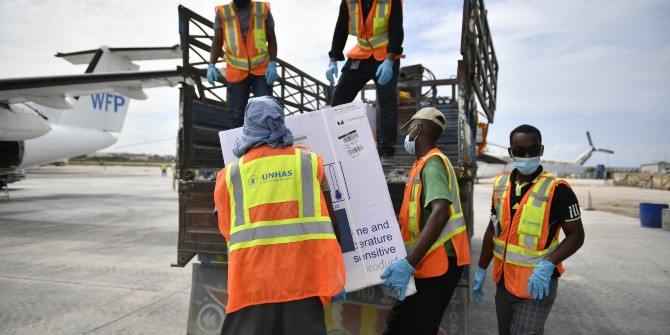Some thought the pandemic would expose the weaknesses of populist leaders. But they took very different approaches to managing COVID, and the evidence about the results is mixed. Brett Meyer (Tony Blair Institute for Global Change) finds that populist leaders who downplayed the pandemic in the early months had more cases and deaths, but so did those who adopted a serious but illiberal response.
As with many aspects of COVID-19, it has been difficult to find clear and consistent information on how populist leaders have performed throughout the pandemic. While many early commentators argued that a public health emergency like COVID would sound the death knell for populists, they often focused on two of the populists who downplayed the virus, Donald Trump and Jair Bolsonaro, as evidence for their claims.
But as my work and that of others has shown, their responses were not representative of most populist leaders. Of 17 populist leaders in power at the beginning of 2020, I found in my August 2020 report that only five downplayed COVID. Although most populists took it seriously, they still differed in how closely they abided by liberal democratic norms. I found that populist leaders in five countries — Hungary, India, the Philippines, Poland, and Turkey— had a serious but illiberal response to COVID, taking excessive emergency powers, harsh/biased enforcement measures, and cracking down on media.
COVID has certainly affected several populist leaders, most notably Donald Trump, who lost the 2020 election in large part due to his erratic pandemic performance. But how have countries with populist leaders fared in terms of cases and deaths? Have their health and economic policies differed systematically from non-populist-led countries? And has the illiberal streak of several populist leaders continued?
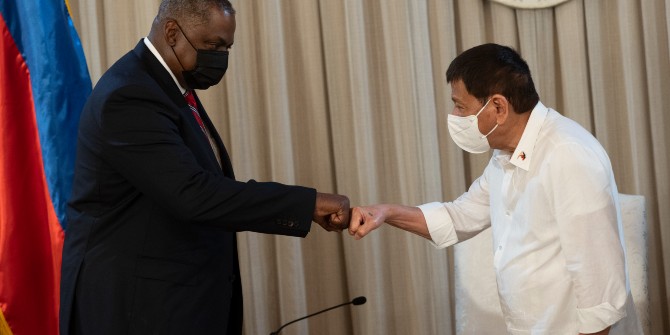
To investigate this, I rely on the Social and Political Correlates Project of the Institutions and Inequality Group at the Social Science Research Center in Berlin (WZB), which has made available open source code to produce a dataset that combines data on COVID health outcomes, policy data, and mobility data with data on countries’ political institutions, economic performance, social structures, and health infrastructure. Bosancianu et al (2020) analyse the social and political correlates of COVID mortality and find that measures of health infrastructure and interpersonal trust predict mortality outcomes but that many social and political variables, including populism, do not produce the hypothesised results.
First, I examine the relationship between having a populist leader in power and COVID deaths/cases for all populists, then disaggregated by the categories that I identified in my August 2020 report, listed in Table 1 below: populists who downplayed the virus, those who took it seriously and had a liberal response, and those who took it seriously but had an illiberal response. I average and aggregate these data by country-month.
Table 1: Populist leaders’ March-July 2020 COVID responses
Country Leader Response type
Belarus Alexander Lukashenko Downplay
Brazil Jair Bolsonaro Downplay
Mexico Andrés Manuel López Obrador (AMLO) Downplay
Nicaragua Daniel Ortega Downplay
United States Donald Trump (through January 2021) Downplay
Bulgaria Boyko Borisov
(through May 2021)Serious-liberal
Czech Republic Andrej Babis Serious-liberal
Italy Giuseppe Conte Serious-liberal
Slovenia Janez Jansa (from March 2020) Serious-liberal
Venezuela Nicolás Maduro Serious-liberal
Israel Benjamin Netanyahu (through June 2021) Serious-intermediate
Serbia Aleksandar Vucic Serious-intermediate
Sri Lanka Gotabaya Rajapaksa Serious-intermediate
Hungary Viktor Orban Serious-illiberal
India Narendra Modi Serious-illiberal
Philippines Rodrigo Duterte Serious-illiberal
Poland Mateusz Morawiecki Serious-illiberal
Turkey Recep Tayyip Erdogan Serious-illiberal
Note: Although I coded the populist leaders of Israel, Serbia, and Sri Lanka as having taken a serious response to COVID that had some illiberal elements, these were to a much lesser degree than our illiberal responses and I combined these leaders with the serious-liberal group here. I mistakenly did not include Slovenian prime minister Janez Jansa as a populist in power in our August 2020 report. We included him in our year-end populism update report and have entered him in the data here as a populist who took a serious-liberal response.
For each outcome variable and coding of populism, I include two sets of regression models: (1) a bivariate model; (2) a multivariate model with control variables and geographic and time fixed effects. I cluster standard errors at the country level in both. Bosancianu et al use a LASSO procedure to select covariates with the overall best predictive value for monthly deaths, which as of 5 July 2021 were respiratory disease prevalence, life expectancy, healthcare quality, healthcare spending per capita, and health data quality. I include these controls in my multivariate models, plus a control for population and fixed effects for 12 regions and for month.
Figure 1: Number of deaths per month
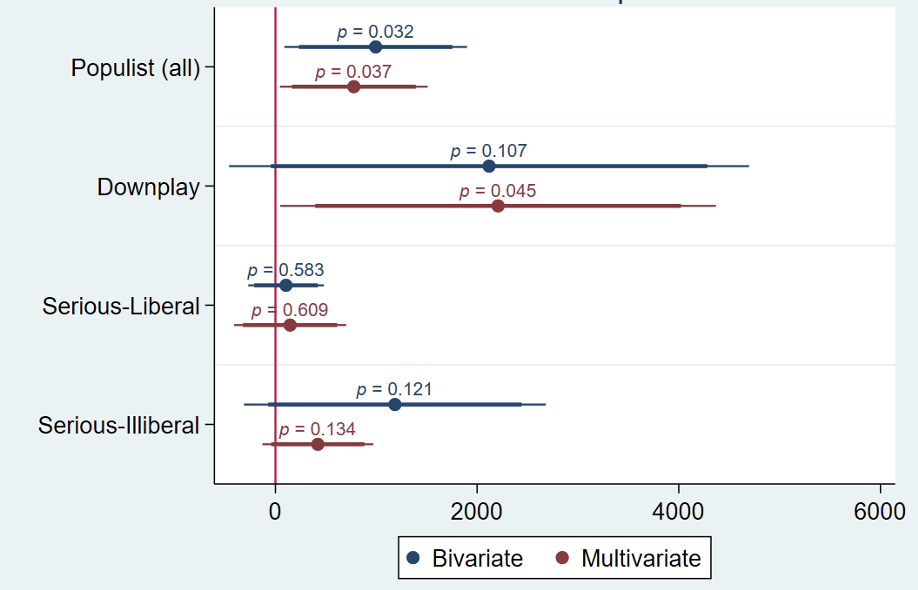
Figure 2: Number of cases per month
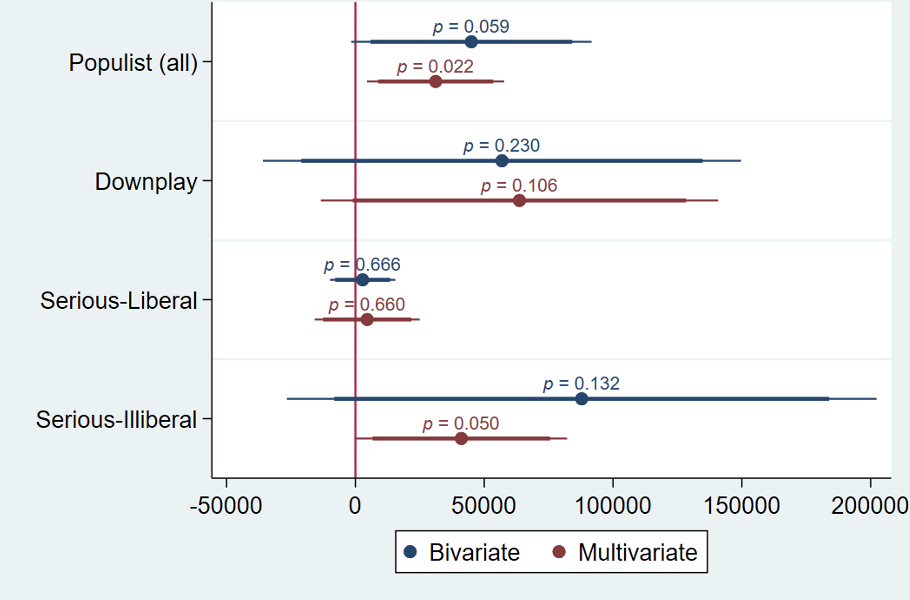
As of 5 July 2021, Bosancianu et al found a growing positive relationship between having a populist in power and COVID monthly deaths that fell just short of statistical significance in their multivariate models. Perhaps because of the small differences in our coding of populism (there are differences between their data and ours because we have updated our data since their project began), and/or my inclusion of regional/monthly fixed effects, I estimate a statistically significant association (p=.04) of just under 800 additional monthly COVID deaths under populist leaders (mean=221, SD=1,138). This result is largely driven by populists who downplayed the virus, who had approximately 2,200 additional monthly COVID deaths (p=.05).
I find similar results for monthly cases. Populist leaders are associated with approximately 31,000 additional monthly cases (Mean=10,250, SD=64,380; p=.02). This result is driven both by populists who downplayed the pandemic (approximately 64,000 additional monthly cases; p=.11) and those who took it seriously but were illiberal (approximately 41,000 additional monthly cases; p=.05).
Next, I turn to populists’ pandemic policy responses and to democratic violations. Data on policy responses come from the Oxford Covid-19 Government Response Tracker (OxCGRT), which includes information on containment/closure policies, economic policies, health system policies, and vaccine policies. Data on democratic violations come from VDem’s Pandemic Backsliding dataset (version 6). Their index is computed quarterly and includes a variety of components, including discriminatory measures, abusive enforcement, excessive emergency powers, spreading disinformation, and restrictions on the media.
Because these outcome variables are government policies/actions rather than health, I include control variables from the Bosancianu et al dataset that should affect governments’ need/capability for action: deaths per million, GDP per capita, and number of veto points, plus region and time fixed effects. I average and aggregate the Oxford CGRT data at the country-month level. Because the VDem democratic violations data are quarterly, I average and aggregate these at the country-quarter level.
Figure 3: Oxford CGRT index
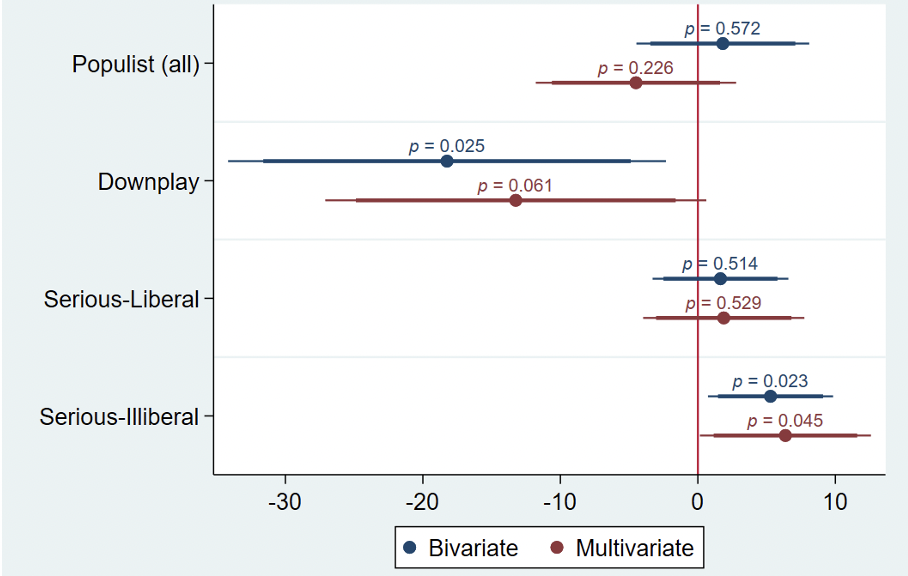
Figure 4: VDem pandemic democratic violations
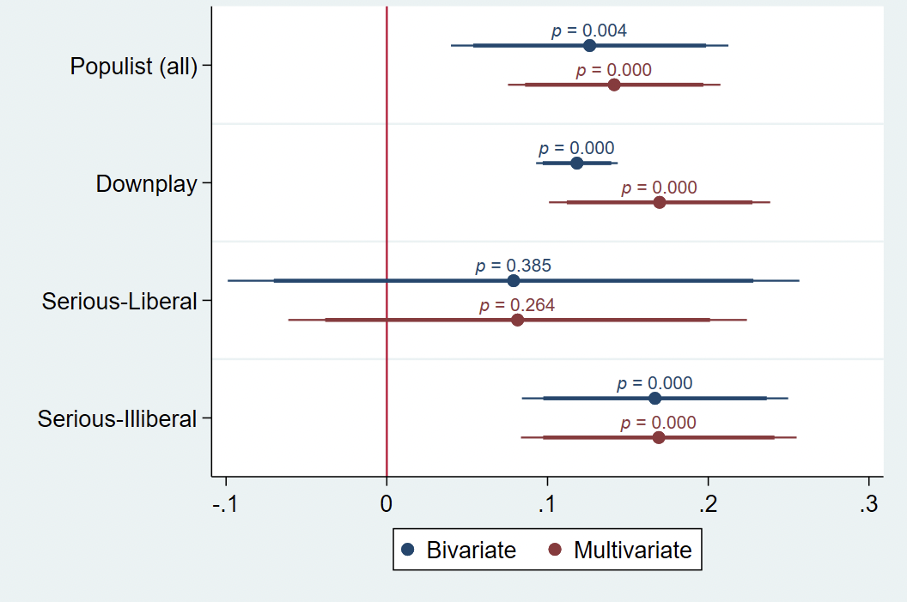
While I find no evidence that populist leaders differed from others in their policy response, this null result conceals interesting heterogeneity. As we would expect, populists who downplayed the virus in the early months had less active policy responses — by about 13 points on the 0-100 point CGRT scale (mean=48, SD=21.9; p=.06). But consistent with their early serious response, serious-illiberal populists were approximately 6 points higher on the CGRT scale (p=.05). This suggests that their poor death/case performance was not due to their policy response.
Turning to democratic violations, it’s perhaps no surprise to see that populists had more of them. This is consistent with existing research on democratic violations under populism both before and during COVID. While it’s also no surprise to see that the early illiberal populists scored .17 points higher on the VDem 0-1 scale (mean=.2, SD=.15; p<.00), populists who downplayed the virus in the early months were just as bad (also .17 points higher; p<.00).
While the estimates are not always precise, I have found evidence that countries with populist leaders performed worse in terms of cases and deaths than those without them. These performances are correlated with actions taken early in the pandemic. Populists who downplayed the pandemic in the early months had more relaxed policy responses and more cases and deaths. The most striking finding is that despite having a more stringent policy response than other leaders, populists who were serious but illiberal in the early months had higher monthly cases and deaths.
One explanation for these results is that they became less serious about their policy responses as the pandemic wore on and their countries had relatively few cases. We see evidence of this in Poland, where the government began to downplay health measures to open the economy, and India, where the government declared victory prematurely over the virus.
Another possibility that merits further investigation is that because serious-illiberal populists all came to power by emphasising divisive socio-cultural issues, they allowed COVID to spread by looking the other way when their supporters wanted special exemptions for religious/cultural gatherings. Perhaps the best example of this is in India, where the Modi government enacted harsh lockdowns in the early weeks but then let the Kumbh Mela gatherings and rallies of political supporters take place. India’s tragic wave of COVID deaths followed shortly thereafter.
This post represents the views of the author and not those of the COVID-19 blog, nor LSE.


